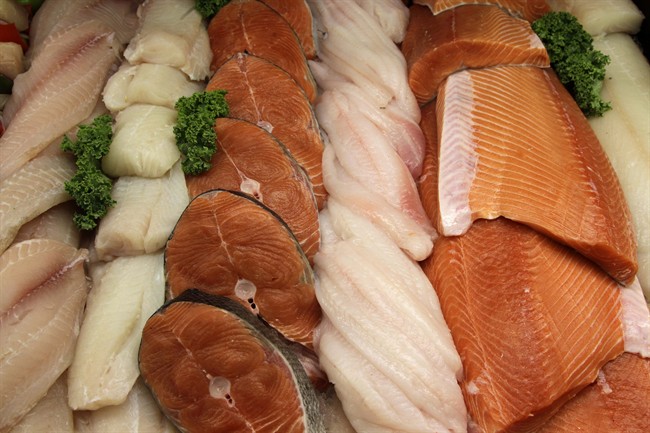How much fish women can eat during pregnancy is becoming a controversial issue: while expectant moms are often warned not to eat too much seafood because of mercury levels, other advice suggests that fish is packed with fatty acids that help with a baby’s brain development.

Now the latest research sounding alarm bells is warning that too much fish consumption during pregnancy could be linked to an increased risk of childhood obesity. But the researchers say there are limitations to their findings: they don’t know how the fish was prepared, what kind of fish they ate, or about the rest of moms’ diet and exercise habits.
After studying the health of expectant moms in 11 countries, Greek scientists say that women who eat fish more than three times per week are putting their babies at risk of being overweight or obese. The risk increases by 22 per cent if moms ate fish more than three times a week.
READ MORE: Eating fish during pregnancy tied to brain boost in babies, study suggests
Right now, the U.S. Food and Drug Administration recommends that women eat about two to three servings of fish each week. That’s about eight to 12 ounces. Health Canada only calls for about 1.5 servings or five ounces of cooked fish per week.
“Our findings indicate that women should adhere to current fish consumption guidelines. In general, women should eat a variety of fish each week and avoid consumption of large predatory fish such as king mackerel, swordfish, shark and tilefish,” lead researcher, Dr. Leda Chatzi, told Global News in an email.
- Capital gains changes are ‘really fair,’ Freeland says, as doctors cry foul
- ‘Dangerous message’: Experts slam anti-sunscreen claims circulating online
- As fake Botox cases prompt alert in U.S., Canada says no new issues reported
- ‘Trying not to die’: Tourism operators loaded with debt despite rising demand
In a review of 15 other studies, Chatzi and her team at the University of Crete looked at the health of 26,000 pregnant women and their babies until their kids were six years old.
Their research spanned 11 countries, including Belgium, France, Italy, Greece, the Netherlands, Poland, Spain, Portugal and the United States.
READ MORE: How much fish should pregnant women eat?
Some countries ate very little fish, such as Belgium, where women would eat only half of a portion each week. In Spain, expectant moms were eating fish about 4.5 times a week.
Turns out, women who ate fish more than three times per week when they were pregnant gave birth to children who ended up with higher body mass indexes at ages 2, 4 and 6 compared to their peers who only ate fish less than three times per week. The babies also had “rapid growth” if their moms ate more seafood during pregnancy.
Eating more fish was also tied to a 22 per cent increased risk of their kids being overweight or obese by the time they turned six. The effects were greater in girls than boys.
The researchers guess that pollutants and hormones in the fish could explain why they found this link. But they conceded there were gaps they needed to fill in.
For starters, the women had to self-report their fish intake so it’s unclear how accurate the information was.
READ MORE: Do babies inherit junk food addictions from their moms?
They also don’t know what types of fish the women were eating – deep sea or river fish, which could determine pollutant amounts, how the fish was prepared, such as if it was fried, steamed or boiled, and if the women were exposed to other environmental factors, too.
They also didn’t get a full snapshot of what the women were eating and how often they were exercising during their pregnancy. Their kids’ diet and lifestyle habits weren’t documented either. These factors could have played key roles in kids’ long-term health.
Earlier this year, Spanish researchers said that eating more fish even in the first trimester could help with improving brain function in babies.
“Seafood is known to be an important source of essential nutrients for brain development, but at the same time accumulates mercury from the environment, which is known to be neurotoxic,” lead researcher, Dr. Jordi Julvez, said in an email to Global News.
READ MORE: New moms, lose baby weight or face diabetes, heart health risk, study warns
The women typically ate about three servings of seafood per week while they were pregnant. But if they ate about 10 grams more per week, their kids’ test scores improved. The link was strongest between improved test scores and if women ate more fish during their first trimester.
Right now, Health Canada says when pregnant, women need more omega-3 fatty acids in their diets to help their babies with brain development. The federal agency recommends that moms eat at least five ounces of cooked fish every week. That’s about one to 1.5 servings.
“Yet many women may avoid eating fish altogether because of concerns about the safety of fish intake during pregnancy,” Health Canada says on its website.
READ MORE: How a father’s diet, lifestyle affect his baby’s healthy development
Fish lower in mercury includes salmon, shrimp, pollock, tuna (light canned), tilapia, catfish and cod, according to the FDA.
Chatzi’s full findings were published Monday night in the journal JAMA Pediatrics.
carmen.chai@globalnews.ca
Follow @Carmen_Chai




Comments